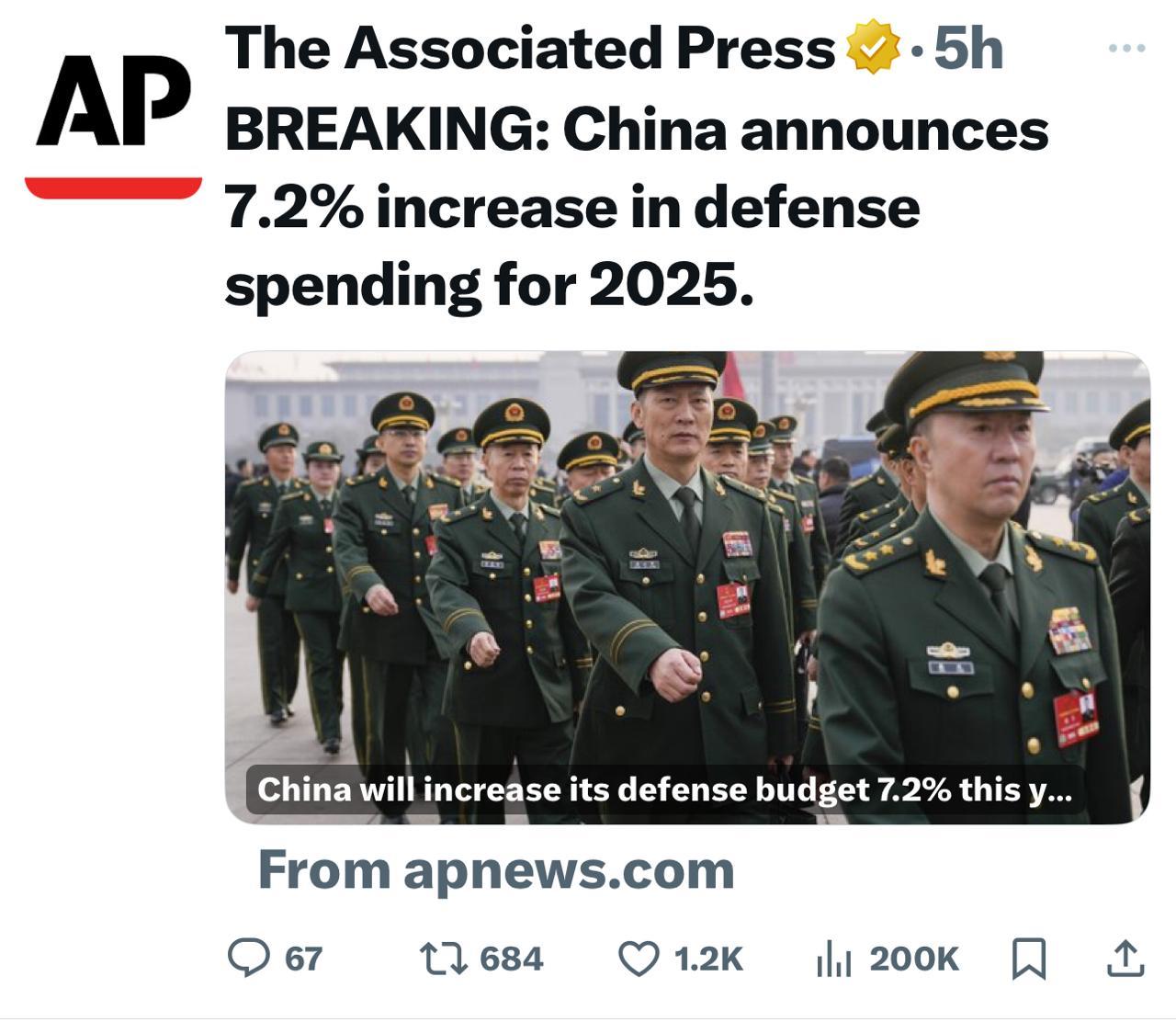The Chinese government today said that if it is war the Trump administration volleys up, then it is war America will get with the world’s other superpower.
Responding to President Trump’s levy of additional sweeping tariffs on China, the Chinese Embassy in the United States wrote on X just hours ago, “If war is what the U.S. wants, be it a tariff war, a trade war or any other type of war, we’re ready to fight till the end.”
To back up their threats, the Chinese Communist Party announced a 7.2 percent increase in military spending, according to the Associated Press, as the Trump administration guts segments of the American military. This is on top of the aggressive investments China has made into both its defensive and offensive capabilities since Xi Jinping came to and consolidated power.
While the CCP has openly exhorted an expansionist agenda over the post decade – mainly in this region – this is the closest the Chinese government has come to threatening war with the United States, ever. And it comes on the heels of a speech recently by U.S. Indo-Pacific Command Admiral Samuel Paparo expressing caution about U.S. readiness to take on China’s military, which commands the largest army in the world.
The Trump Tariffs and the Last Time America Implemented Similar Policies
Mr. Trump placed a 20 percent tariff on Chinese goods effective today. China announced retaliatory tariffs, igniting a trade war along with Canada and Mexico, both countries hit by 25 percent U.S. tariffs.
“Experts say consumers and businesses will be the hardest hit. Companies big and small will face higher costs on the goods they buy from other countries — and could have little recourse but to hike prices themselves,” Wyatte Grantham-Philips wrote today for the AP. “For consumers, that will likely mean more expensive price tags on everything from cars, appliances and other big-ticket items to smaller, everyday purchases including electronics, gasoline and groceries.”
The president has said that the tariffs are meant to squeeze the Chinese government to be more aggressive in stopping the flow of fentanyl into the United States. At the same time, he, other national Republican leaders, and his other supporters have argued that the tariffs are needed to level the trade imbalance and to force production and job creation inside the U.S.
Massive and indiscriminate tariffs predicated on nationalism and protectionist policy have historically been tied to a foreign policy of isolationism. Isolationism with the tariffs in the early 20th century helped to fuel the Great Depression, which was caused primarily by a stock market crash. Economic conditions, much like today’s global economic climate in the west, led to the rise of fascist, authoritarian, and militaristic governments. Those governments fomented – with the appeasement of (most of) Europe and the United States in the 1930s – and led to unchecked aggression by Germany and Japan, leading to World War II.
The U.S. stock market crashed on October 24, 1929, plunging the country then many others into the Great Depression. Parts of Europe, which already was reeling from devastation of World War I and the punishing effects of the Allied mandates on the vanquished, did as several countries’ voting populations have been doing in recent years: they elected authoritarian, fascist governments. The allure was based on populist overtures to both ancient prejudices that blamed economic conditions on groups of people, and promises of national greatness.
Rather than unshackling trade constraints, the U.S. government – led by Republicans at the time – became even more isolated, and in 1930 passed the Smoot-Hawley Tariff Act, worsening the economic downturn.
Those 1930 tariffs increased import duties by 20 percent, which raised prices on food and other items to the point that only the wealthy could afford to purchase these items. The tariffs led to retaliatory tariffs, such as those announced today, and contributed to bank failures.
Meanwhile, as American society was embroiled in what seemed like an endless economic spiral, Adolf Hitler rose to power in Germany on a platform and with tactics strikingly similar to our country’s Donald Trump. The Nazi was democratically elected by Germans disillusioned by their economic hardships since their World War I defeat. Hitler blamed the Jewish people primarily for the economic conditions, spewing conspiracy theories in speech after speech about their control of financial markets and their collusion against the German republic.
Four weeks into his first term as Chancellor of Germany, the Reichstag building – the home of the German parliament – was burned. Hitler blamed the country’s communist party and had communist members of parliament arrested. A month later, on March 23, 1933, using the fire as the trigger and rallying support against the so-called communist and Jewish threat to German civilization, Hitler convinced parliament to pass the Enabling Act.
That was the law that made Hitler a dictator.
The rest, including World War II, is history. It is estimated that more than 1,000 Chamorros were murdered during that war.
Guam and the CNMI are the closest U.S. jurisdictions to China.











